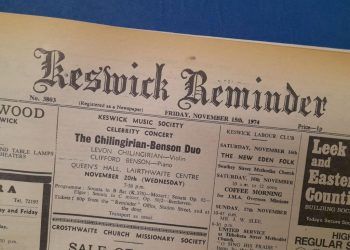
Nobbut Laiking, by Ross Brewster
It’s a giant con. A rip-off. I refuse to respond to any so-called Black Friday deals and bargains.
It used to be a single mad buying day. Now it goes on for weeks. It’s more like the November sales than one great end of the week spending splurge.
You can’t avoid the urgent treatises to buy now, don’t miss out and beat the end of the deal. I wonder, even in a cost-of-living crisis, how many buy things they don’t really need simply because they have been tempted by the advertising lure of Black Friday with its yellow stickers and cross-out prices.
Consumer advice group Which came up with some interesting facts and figures a couple of years ago when they tracked 208 items on sale in eight major stores over a six-month period. Only two per cent were at lower prices in the November sales.
My computer inbox has been flush with temptation this past fortnight. It’s all gone straight into trash. No, I don’t need that 66 inch telly. In fact I would need to move to a bigger property to fit it in. If you see a cut-price deal that’s too good to be true then 100 per cent I can say it is.
It doesn’t take long for the scammers to get in on something that smacks of profit. Some dodgy websites are around. They will most likely take your bank details, but no goods will arrive.
TikTok influencer Kat Leech tells her 40,000 followers impulse buying is the road to ruin. Don’t fall for the adverts. Don’t buy anything that has the spectre of Black Friday on it.
So where did it all start? And why Black Friday which has a rather ominous ring to it?
Like many things, it probably began in the United States after Thanksgiving Day. The shops helped coin the description because for once their ledgers were in the black, showing a profit. Or it could have been the cops who blamed the chaos in the streets prompted by the rush to buy for their endless shifts.
You can’t blame businesses spotting a way to make a few quid, especially given the boom in online sales. But as shoppers we’ve got to learn a simple truth and just say no. Wait and that better deal could be round the corner in the new year.
Facing up to the benefits of the human touch
Two wins for the little guy. Hey, the worm is turning.
First came the reversal of the decision to close train station ticket offices. Train companies naturally want to cut their costs and with just 12 per cent of bookings made face to face, it seemed logical to push all the business online.
Except that 12 per cent added up to five million who find computers hopeless and prefer to buy tickets in person. Soon the rail authorities began getting the message that minorities matter. For once the rush to technology went wrong. A lot of us prefer the human touch. It’s not just that we prefer dealing with a person rather than a website, we are more likely to get the right advice and, in the case of the railways, someone to steer us through the complex ticketing policy.
The owners of Booths supermarkets saw that and a relatively modest tinkering with the tills, bringing back more human contact with their customers, proved a major public relations success that went nationwide. Most of their stores have done away with the emphasis on self-service.
Booths today, the banks and GPs tomorrow? Sadly no. But at least the little guy has enjoyed one moment in the sun.
It’s a matter of importance
Residents of the village of Twyford in Hampshire have won a 12-month battle with the local council over a mis-placed apostrophe. Speaking as a bit of a punctuation fanatic I say good on them.
What does a simple apostrophe matter? It can alter the whole sense of a word or a sentence. Councils are notorious for getting them wrong then claiming their mistakes are deliberate to assist postal deliveries. Modern computer systems can do wonderful things, but they are rubbish at spelling and punctuation.
The villagers have got their St Mary’s Terrace back. There is of course a simple answer. Just call it St Mary Terrace. No need for apostrophe wars and everyone satisfied.
It reminds me of a newspaper I did some writing for several years ago. It was notorious for its mis-spellings. Every week a copy of the paper would be shoved through the office letterbox, errors precisely marked in green ink.
A local schoolteacher was the prime suspect. A tyrant of the incorrect semi-colon and erroneous gerund. The green ink deliveries stopped suddenly the week his death notice appeared in the newspaper.
Obsessive behaviour perhaps. But I empathised with him to a degree. In fact I often carried a piece of chalk in my pocket to correct some of the more glaring errors on pub and café noticeboards. Companions looked away in embarrassment while I rubbed out unnecessary apostrophes.
You’ll be glad to hear that eventually I got a life, and put away the chalk for good.







